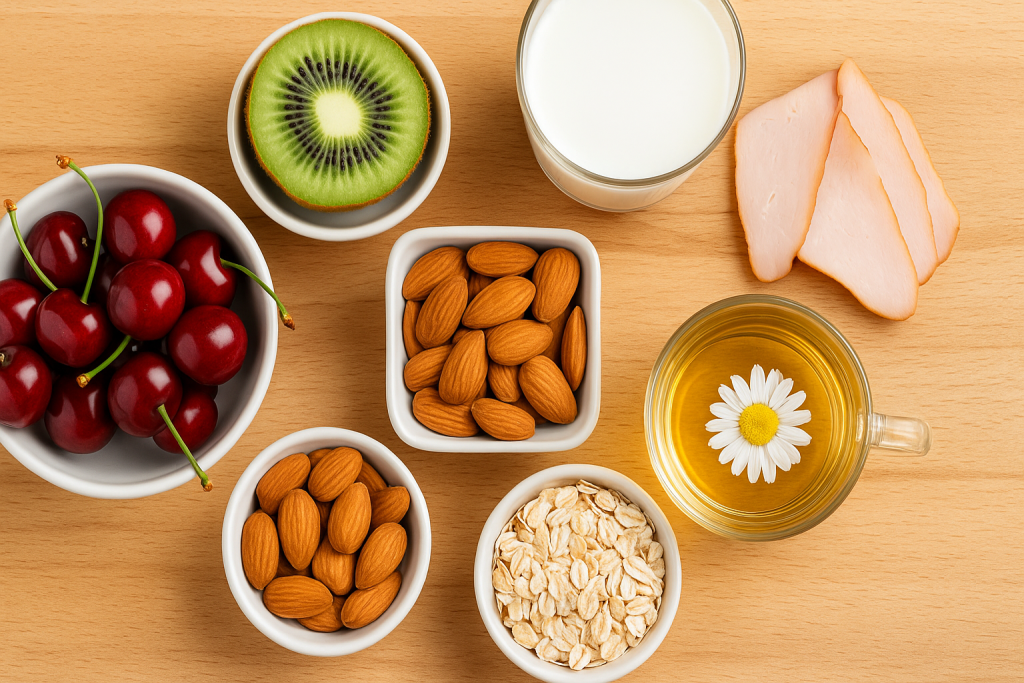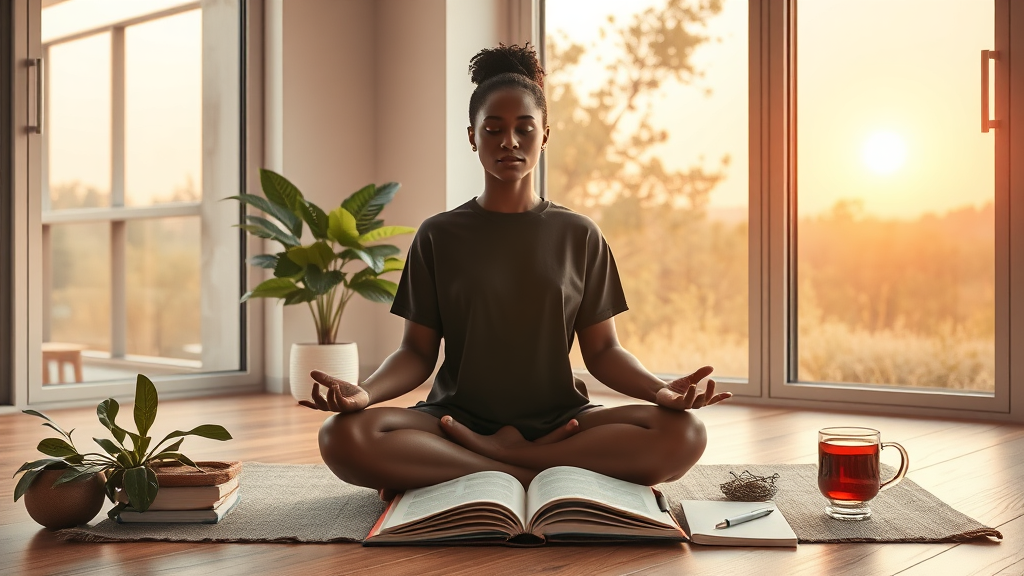
Why Sleep Matters
Sleep is one of the most essential components of good health—just as vital as nutrition and exercise. A consistent, restful night’s sleep helps improve mood, memory, metabolism, immunity, and even heart health. But for many people, falling or staying asleep isn’t always easy.
Before reaching for sleep aids or supplements, consider something more natural: your diet. Certain foods contain nutrients and compounds that can help your body wind down and promote better sleep quality. This guide explores which foods are scientifically backed to help you sleep better—and how to make them a part of your evening routine.
1. The Science of Sleep and Nutrition
Sleep and nutrition are deeply intertwined. Several nutrients play crucial roles in sleep regulation, such as:
- Tryptophan: An amino acid that helps produce serotonin and melatonin.
- Magnesium: A mineral that calms the nervous system.
- Calcium: Aids in melatonin production.
- Vitamin B6: Helps convert tryptophan into melatonin.
- Melatonin: A hormone that signals your body it’s time to sleep.
Incorporating foods rich in these compounds can make a noticeable difference in how quickly and deeply you sleep.
2. Top 10 Foods That Promote Better Sleep
1. Cherries
Cherries—especially tart cherries—are one of the few natural sources of melatonin. Studies show that drinking tart cherry juice can improve both sleep duration and quality.
How to enjoy:
Drink a small glass of tart cherry juice about 1–2 hours before bed or add cherries to your evening snack.
2. Bananas
Bananas are rich in magnesium and potassium, which help relax muscles and nerves. They also contain tryptophan and vitamin B6, which support serotonin and melatonin production.
How to enjoy:
Eat a banana with a spoon of peanut butter or blend into a sleep smoothie.
3. Almonds
Almonds are high in magnesium, which has been shown to improve sleep in people with insomnia. They also contain healthy fats that can keep your blood sugar stable overnight.
How to enjoy:
Have a handful as an evening snack or sprinkle on a bowl of oatmeal.
Follow our social media to get an daily update!
4. Kiwi
This small green fruit is surprisingly powerful. Studies suggest that people who eat two kiwis before bed fall asleep faster and sleep longer. Kiwis are rich in antioxidants and serotonin.
How to enjoy:
Slice and eat two kiwis about an hour before bedtime.
5. Warm Milk
There’s a reason warm milk is a classic bedtime remedy. It contains tryptophan, calcium, and vitamin D—all of which support sleep hormone production.
How to enjoy:
Warm a glass of milk and add a pinch of cinnamon or turmeric for extra flavor and health benefits.
6. Oatmeal
While we usually eat oatmeal in the morning, it also makes a good evening snack. Oats are a natural source of melatonin and complex carbs that help more tryptophan reach the brain.
How to enjoy:
Make a small bowl of plain oatmeal topped with bananas or almonds.
7. Turkey
Turkey isn’t just for Thanksgiving—it’s also one of the richest sources of tryptophan. It also provides high-quality protein, which can help regulate blood sugar during sleep.
How to enjoy:
Add turkey slices to a whole-grain sandwich or eat a small portion at dinner.
8. Chamomile Tea
Technically not a food, but chamomile deserves mention. It contains apigenin, an antioxidant that binds to brain receptors to promote sleepiness.
How to enjoy:
Drink a cup of chamomile tea 30–60 minutes before bedtime.
9. Walnuts
Walnuts contain melatonin, magnesium, and omega-3 fatty acids—all excellent for supporting sleep. The healthy fats also help stabilize blood sugar overnight.
How to enjoy:
Mix into yogurt or eat a small handful before bed.
10. White Rice
Though high in carbs, white rice has a high glycemic index, which may help you fall asleep faster by increasing insulin and making tryptophan more available.
How to enjoy:
Eat in moderation as part of dinner—pair with protein and veggies for balance.
3. Foods and Drinks to Avoid Before Bed
Some foods can negatively affect your ability to sleep well. These include:
- Caffeine (coffee, soda, chocolate): Stimulant that can stay in your system for up to 8 hours.
- Spicy foods: May cause indigestion or heartburn at night.
- Heavy, fatty meals: Can disrupt digestion and make it harder to fall asleep.
- Alcohol: While it might make you sleepy at first, it disrupts REM sleep later in the night.
- Sugary snacks: Cause blood sugar spikes and crashes that can wake you up at night.
4. Best Times to Eat for Better Sleep
What and when you eat is just as important:
- Avoid large meals at least 2–3 hours before bed.
- Opt for a light snack 30–60 minutes before sleep, if you’re a little hungry.
- Balance carbs with protein or healthy fats to keep blood sugar stable.
5. Easy Bedtime Snack Ideas
Try these simple combinations:
- Banana slices with almond butter
- Oatmeal with warm milk and cinnamon
- Greek yogurt with walnuts and honey
- Rice cakes with turkey and avocado
- Chamomile tea with a handful of cherries
6. Additional Lifestyle Tips to Improve Sleep
While food plays a big role, it works best alongside healthy habits:
- Stick to a regular sleep schedule
- Create a relaxing bedtime routine
- Avoid screens and blue light an hour before bed
- Keep your room cool, quiet, and dark
- Limit naps to 20–30 minutes
Conclusion: Eat Your Way to Better Sleep
Improving your sleep doesn’t have to mean medication or drastic changes. With the right foods in your daily diet—especially in the evening—you can support your body’s natural sleep-wake cycle and fall asleep more easily.
So tonight, instead of reaching for your phone or another episode, reach for a kiwi, a cup of chamomile tea, or a bowl of oatmeal. Your body—and your mind—will thank you in the morning.



